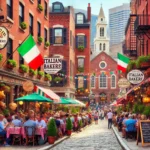New Orleans, often described as the “birthplace of jazz,” has long held a special place in American music history. Situated at the crossroads of various cultures—African, French, Spanish, and Caribbean—the city’s unique blend of traditions laid the foundation for the creation of a revolutionary new genre: jazz.
Early Influences: A Melting Pot of Cultures
New Orleans was a cultural melting pot during the 19th century, with a population that included African-Americans, Creoles, and European immigrants. These diverse groups brought with them a variety of musical styles, from African rhythms and French opera to brass band traditions. It was in this setting that African-American musicians began fusing these elements, leading to the early development of jazz.
One of the key influences on early jazz was Congo Square, a gathering spot where enslaved and free African-Americans would meet to play music, dance, and share their cultural heritage. The sounds from Congo Square—combined with European instruments like the piano, trumpet, and clarinet—helped create the syncopated rhythms and blues scales that would become central to jazz.
The Birth of Jazz: Late 19th to Early 20th Century
By the late 1800s, New Orleans was bustling with musicians experimenting with new sounds. Ragtime, blues, and brass bands were especially popular in the city’s dance halls, bars, and street parades. It was in this environment that jazz began to emerge as a distinct musical form.
Key figures like Buddy Bolden, often credited as the first jazz musician, helped define the genre. His innovative approach to improvisation, blending blues with brass band music, laid the groundwork for future jazz performers. Bolden’s style was characterized by the use of “hot” music—up-tempo rhythms and bold improvisations—which became a hallmark of early jazz.
By the early 20th century, other jazz pioneers such as Jelly Roll Morton and King Oliver had begun to gain popularity, spreading the sound of jazz from New Orleans to cities like Chicago and New York.
Jazz’s Global Expansion: New Orleans and Beyond
As jazz continued to develop, it quickly spread beyond New Orleans. The Great Migration of African-Americans from the South to the North between 1916 and 1970 played a critical role in this expansion. Musicians moved to cities like Chicago, New York, and Los Angeles, bringing jazz with them and influencing the growth of new styles like swing, bebop, and later, modern jazz.
While jazz became a nationwide and even global phenomenon, New Orleans remained at the heart of its history. The city’s French Quarter, with its lively music scene and parades, continues to celebrate jazz traditions. Preservation Hall, founded in 1961, stands as a living testament to New Orleans’ ongoing contribution to jazz music.
Cultural Significance of Jazz in New Orleans
Jazz is not just a music genre; in New Orleans, it’s a way of life. The improvisational nature of jazz reflects the city’s culture of spontaneity, community, and celebration. Annual events like the New Orleans Jazz & Heritage Festival continue to draw visitors from all over the world, eager to experience the music in its birthplace.
The cultural significance of jazz in New Orleans goes beyond its historical roots. The genre has been a platform for social expression, particularly within the African-American community. Over the years, jazz has been a form of resistance, celebration, and identity, with New Orleans playing a pivotal role in these cultural movements.
The rich history of jazz in New Orleans is a testament to the city’s unique ability to fuse diverse cultural elements into something revolutionary. As the birthplace of jazz, New Orleans not only gave rise to a genre that would transform music worldwide but also established itself as a hub for innovation and expression.
Even today, jazz lives on in the streets of New Orleans, in its festivals, clubs, and communities. The city continues to nurture this musical legacy, ensuring that future generations will experience the sounds and soul of jazz.


